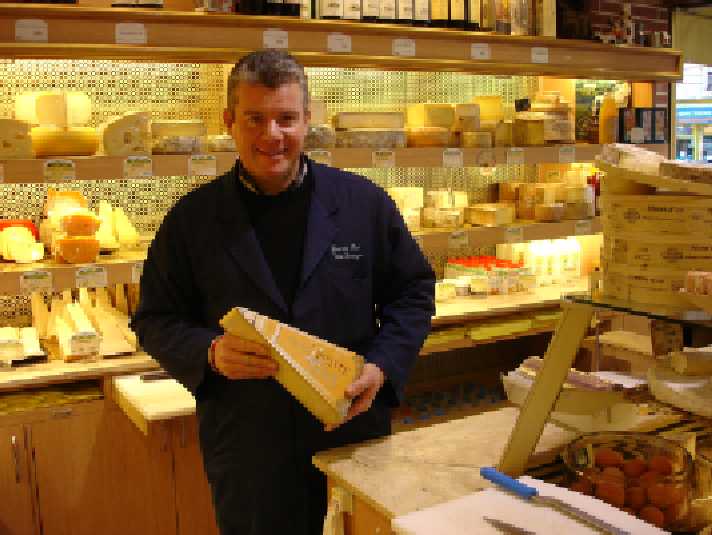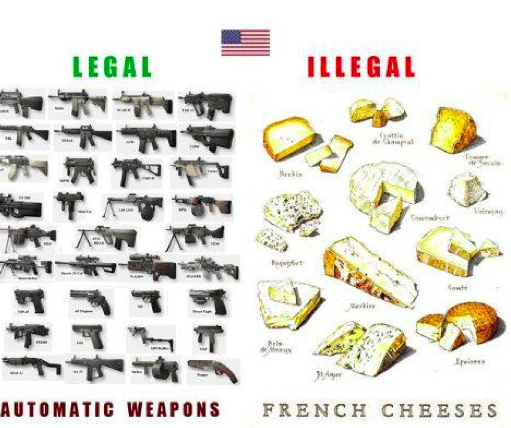|
| Cheese
in France |
|
To know
more about cheese : Sign up for the next Wine and Cheese Tasting in Paris with Harriet Welty |
|
|
|
| Facts and figures about
cheese |
|
Cheese etiquette |
-
France has hundreds of different
cheeses (everybody knows the word, attributed to Charles
de Gaulle (or to Churchill?) : "How can you govern a country
which has 365 different sorts of cheese ") : such a variety
does not exist in any other cheese country
-
The categories of cheese
are (according to the excellent book by Randolph Hodgson
French Cheeses, Doring Kindersley,1996) :
-
Fresh, rindless, no affinage
: ex. fromage frais
-
Uncooked, unpressed, soft with
white mould : ex. Camembert
-
Uncooked, unpressed, soft with
washed rind : ex. Munster
-
Uncooked, unpressed, soft, natureal
mould sometimes covered with ashes : ex. chêvre
-
Uncooked, unpressed, soft, with
veins of blue mould : ex. bleu
-
Uncooked, unpressed, semi-hard
with natural mould : ex. Saint-Nectaire
-
Uncooked, unpressed, semi-hard,
with washed and waxed rind : ex. Port-du-Salut
-
Cooked, pressed, hard : ex.
Beaufort
-
Started with whey : ex. Brocciu
-
Product based on cheese : ex.
fromage fort
-
About the very odorous "époisse",
French poet Paul Valéry said "it is the smell of
the feet of God"!
-
The Raw-Milk-War :
the best cheeses are made with raw milk. It gives more taste
because the (good) germs are alive and well. Most foreign regulations
limit or forbid it, in the name of hygiene. France has to fight
against the European
administration which, under the pressure of countries which
do not have any good cheese want to ban raw milk cheese from
French stomachs. This war is now almost a victory for France.
France also fights against US and Canadian regulations to be
able to export its most massive destruction cheeses (M.D.C.)
but this war is far from being won yet. See also the Wood-Shaving-War, the Rosé War and the Chocolate War.
-
Each region of France
has its own cheeses, with some specificities : Auvergne (Center)
has the largest variety and some of the best, Corsica has some
of the strongest, Flanders (North) some of the stinkiest, etc
-
Some of the most "spectacular"
cheeses are (but this is a matter of personal taste) :
-
Mont-d'Or : almost liquid, for
dinner at Christmas or New Year Eve
-
Puant-de Lille : the worst smell
and a very delicate taste
-
Saint-Nectaire : many people
consider it the King of Cheeses
-
More to come....
-
The French consumption
is very high : 24,6 kilos/year (source : FAO-2002) compared to
15,2 for USA and 10 for UK. See detailed comparative figures.
|
|
 |
M.Priet, cheese
shop owner Rue des Pyrénées, ParisI |
If you have (French) guests,
always offer cheese after the main course and before dessert,
with a minimum choice (two or three, but a real "
plateau de fromages " has always more than that) ; it is
a tradition to circulate the plate only once (no second helping
)
-
A cheese plate is not a meal
: it comes at the end
of "real" meal ; do not invite French people and offer
them only cheese !
-
Depending on its shape, each
cheese must be cut according to specific rules : for instance,
do not cut only the blue part of blue cheese or cut round cheeses
from tre center !
-
Don't be prejudiced : very smelly
cheeses do not necessarily taste strong, try blue cheeses and
do not be afraid of their taste, etc...
-
Try to avoid keeping cheese
in the refrigerator : it kills the taste
-
Depending on its taste and its
category, a cheese matches better with certain wines than
with others : it is not rigid but there are rules
- it is not necessarily red wine
that matches the best
- try to associate wine and cheese
from the same region
- sweet white wines (Sauternes,
Loupiac,..) go very well with blue cheeses (Roquefort, Bleu d'Auvergne,...)
- pair dry white wine with goat
cheeses and sweet white wine with very strong cheeses
- with camembert, you can try
cider
- More about wine
According to our "statistics",
in our Wine & Cheese Tastings,
the American preferences, in term of French cheeses, are :
| most appreciated
cheeses... |
|
least appreciated
cheeses... |
| tasting relatively
familiar (comté, mimolette,..),
already known (camembert, brie,..) |
|
too strong (Roquefort,
some goat cheeses like Corsican,...), very smelly (Epoisses,
Vieux Lille,...) |
More about cheese :
|
|
For more :
DID YOU KNOW THAT...? In Paris every years, there is a contest between local bakers : "Who makes the best baguette?". The tradition is that the winner becomes, for a whole year, the supplier of the Elysee palace and of the President of France.
|
|
Are French cheeses dangerous ?
 For most French people, the ban of some French cheeses is hard to explain... For most French people, the ban of some French cheeses is hard to explain...
|
| To related pages
: tips
on food, French attitudes, interculturaldifferences, etc... |
|
To table
of contents
To top
of the page
Back to home
page
|
Harriet Welty
Rochefort writes articles and books about France and the French.
Order her books :
- "Joie de Vivre", Secrets of Wining, Dining and Romancing like the French, St.Martin's Press, New York, 2012
- "French Toast, An American in Paris
Celebrates The Maddening Mysteries of the French", St.Martin's Press,
New York, 1999
- "French Fried, The Culinary Capers
of An American in Paris", St.Martin's Press, New York, 2001
More on Harriet's books (excerpts, upcoming
events, testimonials, etc..)
|
| To
email
me |
If you like this site, please bookmark it or create
a link! |
|